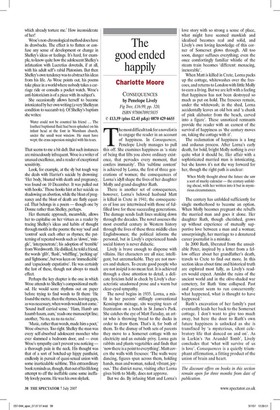The good ended happily
Charlotte Moore CONSEQUENCES by Penelope Lively Fig Tree, £16.99, pp. 320, ISBN 9780670915835 £13.59 (plus £2.45 p&p) 0870 429 6655 The most difficult task for a novelist is to engage the reader in an account of happiness. In Consequences, Penelope Lively manages to pull this off. She examines happiness as 'a state of being that lifts you above ordinary existence, that pervades every moment, that confers immunity'. This 'sublime content' is achieved by Lorna, the first of three generations of women; the consequences of Lorna's idyll shape the lives of her daughter Molly and grand-daughter Ruth.
There is another set of consequences, however; Lorna's beloved husband Matt is killed in Crete in 1941; the consequences of loss are intertwined with those of fulfilled love for these succeeding generations. The damage sends fault lines snaking down through the decades. The novel assesses the most eventful century in Western history through the lives of these three middle-class Englishwomen; the political informs the personal, but in Lively's experienced hands social history is never didactic.
Lively is brave enough to dispense with villains. Her characters are all nice; intelligent, but unremarkable. They are not movers and shakers. To create good people who are not insipid is no mean feat. It is achieved through a close attention to detail, a delicate lyricism held in check by Lively's characteristic unadorned prose and a warm but clear-eyed sympathy.
The novel begins in 1935. Lorna, a misfit in her parents' stiflingly conventional Kensington ménage, sits weeping tears of frustration on a bench in St James's Park. She catches the eye of Matt Faraday, an artist who is throwing bread to the ducks in order to draw them. That's it, for both of them. To the dismay of both sets of parents they move to a Somerset cottage with no electricity and an outside privy. Lorna guts rabbits and plants vegetables and finds that 'now there is a point to everything'. Matt covers the walls with frescoes: 'The walls were dancing, figures spun across them, holding hands, man and woman, naked, vibrant, joy ous.' The district nurse, visiting after Lorna gives birth to Molly, does not approve.
But we do. By infusing Matt and Lorna's love story with so strong a sense of place, what might have seemed mawkish and idealised becomes real and solid, and Lively's own loving knowledge of this corner of Somerset glows through. All too soon, danger suffuses everything; even the once comfortingly familiar whistle of the steam train becomes 'different: menacing, inexorable'.
When Matt is killed in Crete, Lorna packs up the cottage, whitewashes over the frescoes, and returns to London with little Molly to earn a living. But we are left with a feeling that happiness has not been destroyed so much as put on hold. The frescoes remain, under the whitewash; in the shed, Lorna accidentally leaves an old box and 'a chunk of pink alabaster from the beach, carved into a figure'. These unnoticed remnants provide the reader with an earnest of the survival of happiness as `the century moves on, taking the cottage with it'.
The reclamation of happiness is a long and arduous process. After Lorna's early death, for bold, bright Molly nothing is ever quite what it should be. Her affair with a sophisticated married man is intoxicating, but she knows it's not the way forward for her, though the right path is unclear: When Molly thought about the future she saw a sort of murky calendar — the century unfolding ahead, with her written into it but in mysterious circumstances.
The century has unfolded sufficiently for single motherhood to become an option. When Molly becomes pregnant she rebuffs the married man and goes it alone. Her daughter Ruth, though cherished, grows up without experience of mutually supportive love between a man and a woman; unsurprisingly, her marriage to a denatured career journalist is a mistake.
In 2000 Ruth, liberated from the unsuitable Peter, inspired by a letter from a fellow officer about her grandfather's death, travels to Crete to find out more. In this section ideas about time and historical truth are explored most fully, as Lively's readers would expect. Amidst the ruins of the ancient world and in the olive-shaded war cemetery, for Ruth 'time collapsed. Past and present seem to run concurrently: what happened, what is thought to have happened.'
Ruth's excavation of her family's past eventually leads her back to the Somerset cottage. I don't want to give too much away, but here the door to Ruth's own future happiness is unlocked as she is transfixed by 'a mysterious, silent celebratory life that danced on and on'. As in Larkin's 'An Arundel Tomb', Lively concludes that 'what will survive of us is love'. Consequences is a quietly triumphant affirmation, a fitting product of the union of brain and heart.
The discount offers on books in this section remain open for three months from date of publication.



















































 Previous page
Previous page